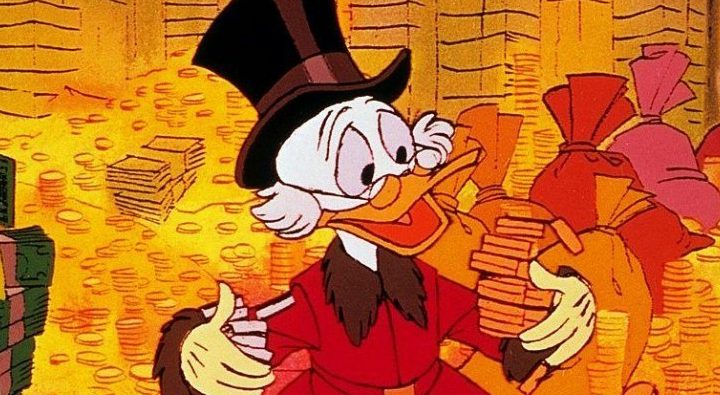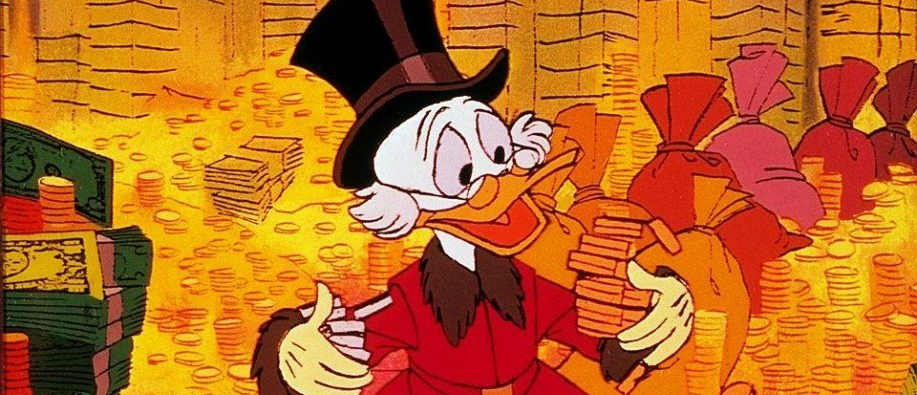It’s hard to believe a full month has passed since Christmas.
Technically, there is more daylight in January than in December. The sun is slowly but surely rising sooner and setting later. Yet, the world feels darker now that Christmas lights and other festive decorations have been packed away. In the January gray, I try to hold on to the glow of Christmas, to remind myself the beacon-light of the Christmas star still shines.
I find myself singing Christmas hymns and eating Christmas sweets I’ve held back especially for these challenging days. The other day, I even watched my favorite childhood animated Christmas special: Mickey’s Christmas Carol, Disney’s adaptation of the Charles Dickens classic, which I did not do in December. Something about this Disney short always has spoken to me in ways that uplift my spirits.
Growing up, part of my attraction to Mickey’s Christmas Carol was a longing to be part of a world (that seemed) more attractive than the one around me: one replete with firelight and candlelight, old-world charm, and snow for the holidays. Not a perfect world but one in which tangible, meaningful change actually happens.
Scrooge McDuck mends his ways. By the end of the story, he is filling the pockets of charity volunteers with gold coins, making Bob Cratchit his partner and giving Bob’s family the kind of bountiful Christmas celebration they deserve. He is not just spreading cheer, he’s doing justice. There’s a bit of Zacchaeus in Scrooge.
“There’s a bit of Zacchaeus in Scrooge.”
Of course, characters like Dickens’ Scrooge and Luke’s Zacchaeus endure because they are the exception rather than the rule. They embody what could be, what should be, but so very often is not.
Despite the fact that A Christmas Carol never has gone out of print since its first run in 1843, and new adaptations of the story regularly appear on stage and screen, the lesson of the novel seems largely confined to the page. The sad reality is that the Scrooges of the world typically remain Scrooges. Recent economic data confirm this.
Wealth inequality on the rise
After a few years of improvement in the second decade of the 21st century, wealth inequality is once again on the rise. The global wealth gap has returned to Gilded Age proportions.

Source: USA Today
In the United States, the poverty level soared in 2022. And in 2023, the Federal Reserve reported the top 1% of U.S. income earners. now control more wealth than the entire American middle class. The gravitation of wealth toward the richest of the rich is accelerating at such a pace that, just last week, Oxfam released a report predicting the world’s first trillionaire could emerge within 10 years.
To understand the exponential difference in wealth between a millionaire, a billionaire and a trillionaire, a recent social media trend is surprisingly helpful. Instead of thinking in small units of money (dollars), we can make a comparison using small units of time (seconds). One million seconds is 12 days, the length of Christmastide. One billion seconds is 31 years and eight months. That’s how much richer a billionaire is than a millionaire. And a trillion seconds? That’s 31,688 years.
Extreme wealth disparity on this scale certainly is not a new problem in America (the Gilded Age) or the world at large (Colonialism). However, there is something different about the current age of inequality. Like an economic January, it feels darker, grayer than what came before.
In eras past, the rich expressed, even if begrudgingly, a certain sense of obligation toward their country, their community and humanity at large. In recent years, the priorities and prerogatives of the very richest appear to have become more insular. The 2021 edition of the Forbes 400 reported more than one-third (156) of the world’s richest individuals donated less than 1% of their immense wealth to charity.
Modern disassociation
Guido Alfani, professor of economic history at Bocconi University in Milan, Italy, argues this disassociation of the 21st century’s super-rich from the rest of society is more than an appearance. In a guest essay for the New York Times in November, Alfani documents how the wealthiest among us have resisted contributing a higher percentage of their resources toward the greater good in ways their predecessors rarely did, especially in times of acute crisis such as we have experienced since 2020.
The COVID-19 pandemic, global lockdowns, ensuing labor shortages, supply line disruptions and soaring inflation, all complicated and compounded by wars in Ukraine and Gaza, have wreaked havoc on most household and civic budgets. Meanwhile, the top 1% of income earners not only had the assets to weather the pandemic and its fallout with little muss or fuss, but many of them also have directly benefitted from it all (see Jeff Bezos).
The 10 richest people in the world have seen their collective wealth double since the pandemic began.
Alfani offers two primary reasons for this change in attitude. One is the increased direct involvement of the super-rich in the representative democracies of the West. Silvio Berlusconi was among the first. Donald Trump is the most (in)famous. Unmentioned, but well worth remembering, are particular circumstances in America that have quickened this trend. The mindboggling and ever-increasing expense of running for office has dissuaded many potential candidates of modest means from launching campaigns.
Simultaneously, and more significantly, the 2010 Citizen’s United Supreme Court decision has given the uber wealthy an outsized ability to influence elections and legislation behind the scenes through virtually unlimited political contributions. Alfani worries that, because the 1%’s political influence prevented Western governments from paying for pandemic crisis responses through higher taxes on the 1% — in Europe as well as in North America — the increased public debt of Western nations threatens additional instability that will make life more precarious for everyone.
The second reason Alfani postulates for the growing indifference of the 1% is the current generation of the world’s super-rich is not overly concerned about the fate of their immortal souls, nor are they motivated by a sense of patriotism. Consequently, moral appeals to generosity, such as those Jacob Marley made to Scrooge, do not hold the kind of persuasive power they once did. In such an environment, Alfoni fears outbreaks of violence, which has been one of the historical solutions to which the masses have resorted when the rich have shown indifference to the very real plights of ordinary folks (see Marie Antoinette).
Become informed
Confronted with such a difficult and disparaging scenario, it’s hard to know how to respond or what to do. One thing we must not do is wait around lackadaisically for the ghosts of Christmases past to shock the likes of Musk, Bezos and Zuckerberg to their senses and shake some cash from their pockets. Whatever steps we take, we must take them with our own feet.
One of the most basic and important things we can do is to become more informed and help others understand the magnitude of the wealth disparities that exist in our nation and around the world. That’s one of the main reasons I am writing about it, and not for the first time.
Our tendency is to focus myopically on our own successes and/or struggles. We need to put both in context and understand there is no legitimate reason for any American to be going without. There is more than enough wealth and resources to go around. Scarcity is the result of a tax structure and a web of economic policies that funnel the lion’s share of America’s wealth — built on the labor, creativity and knowhow of America’s workforce — into a handful of coffers at the top.
“Wealth disparity is not talked about on the campaign trail because voters and reporters rarely ask any questions about it.”
We can loosen the lids of those coffers by the way we vote. Regardless of our net worth, all of us have a voice, and the ballot box is our microphone. We can demand action by supporting candidates who favor campaign finance reform, higher taxes on the super-rich, and windfall taxes on pandemic corporate profiteering. We can choose to make wealth and wage inequality issues candidates must confront. Wealth disparity is not talked about on the campaign trail because voters and reporters rarely ask any questions about it.
Moral and theological dimensions
There are also moral and theological dimensions to the injustice of such extreme disparity to which the church can and should speak, even if moral appeals don’t carry the same weight with the super-rich they once did. Their moral compasses aren’t the only ones that matter, and prophetic witness is (supposed to be) part of the church’s job description.
Churches should seize this opportunity to be the church.
Alfani cites a 15th-century humanist treatise, “On Avarice,” that refers to the “barns of money” held by the richest of the rich. Jesus’ Parable of the Rich Fool (Luke 12:13-21) makes use of a similar image, urging us to be “rich toward God,” which involves more than cultivating our inner devotional lives. Of all the canonical Gospel writers, Luke won’t allow us to “spiritualize” such matters — not exclusively. Being rich toward God necessarily involves being generous toward our neighbors (see the Parable of the Good Samaritan in Luke 10 and the Parable of the Rich Man and Lazarus in Luke 16), including those who “don’t deserve it” (see the Parable of the Lost Son in Luke 15).
“For far too long we’ve sequestered Zacchaeus inside a children’s song.”
Perhaps most felicitously, the church has an opportunity to reclaim — and model — the example of Zacchaeus in Luke 19. For far too long we’ve sequestered Zacchaeus inside a children’s song. This rich man’s witness isn’t that he climbed a sycamore tree to see Jesus. His witness is that he saw and understood Jesus. He repented, vowing to give away half his possessions and repay four-fold anyone he had taken advantage of. In the Greek text of Luke 19:8, the verbs the NRSV translates “I will give” and “I will repay” are actually in the present tense. Zacchaeus speaks as if he is already doing it.
A wee little man
That, of course, is not what we want to hear, which is why we’ve made Zacchaeus into a wee little man for children’s choirs rather than a vaunted exemplar for adult discipleship.
We don’t want to consider reparations as part of repentance. We certainly don’t want to entertain the possibility that our affluent success in “free market” enterprises is the result of anything other than our hard work and God’s blessing.
We should remember, however, that as a tax collector Zacchaeus was performing a necessary service for the Roman Empire. Enriching himself in the process was un-problematic in the eyes of the law or his peers. A healthy personal profit was the reward for undertaking a thankless and sometimes troublesome task. Based on the dominant value structures of his day, Zacchaeus was not doing anything wrong.
In such a skewed, disparate economic environment, the millionaires within the 21st-century church (there are more than a few — perhaps even the odd billionaire or two) have an opportunity to model a different relationship to wealth than building bigger barns, bigger homes or even bigger sanctuaries. Radical generosity is a powerful witness to Jesus and the alternative system of weights and measures to which his reign is calibrated.
It’s also the solution to the injustices of egregious wealth disparity. From Zacchaeus to Scrooge to now, the formula for tangible, meaningful change hasn’t changed. When we love our neighbours as ourselves; when we hoard less and give more; when we are generous rather than miserly, the world becomes a brighter, better, more humane place — for us as well as well as for others.

Todd Thomason
Todd Thomason is a gospel minister and justice advocate who has served as pastor of churches in Virginia, Maryland and Canada. He holds a doctor of ministry degree from Candler School of Theology at Emory University and a master of divinity degree from McAfee School of Theology at Mercer University. Currently, he is a Ph.D. candidate in New Testament and Christian origins at the University of Edinburgh in Scotland. In addition to Baptist News Global, Todd writes at viaexmachina.com.


